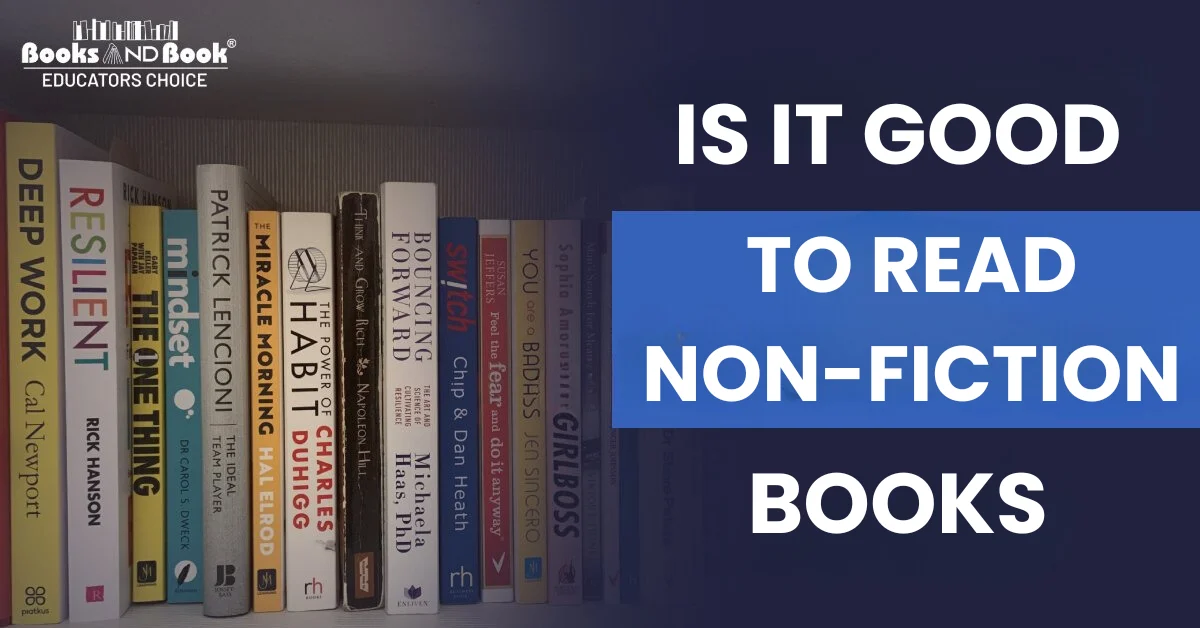In the realm of literature, a common query often arises: Is it good to read non-fiction books?
This question is not just about preference but also about understanding the value of non-fiction books.
While some readers gravitate towards the imaginative worlds of fiction, others find solace and wisdom in the reality-rooted pages of non-fiction.
The benefits of reading non-fiction books are manifold, ranging from knowledge acquisition to the development of critical thinking skills.
However, like any genre, non-fiction has its drawbacks, which merit consideration.
Is It Good to Read Non-Fiction Books?
Certainly! Reading non-fiction books is incredibly advantageous for personal growth and intellectual enrichment. Unlike fiction, non-fiction books provide factual information and insights into real-world events, people, and ideas.
They offer an opportunity to delve deep into various subjects, from history and science to self-improvement and biographies, allowing readers to broaden their knowledge and understanding of the world around them.
Additionally, non-fiction books stimulate critical thinking by presenting arguments, evidence, and perspectives, encouraging readers to analyze and evaluate information critically.
Moreover, reading non-fiction can inspire curiosity and ignite a passion for learning, as it exposes readers to new ideas, concepts, and discoveries.
By incorporating non-fiction books into your reading routine, you open yourself up to a world of knowledge and endless opportunities for personal and intellectual growth.
Exploring the Merits of Reading Non-Fiction Books
The debate on the value of non-fiction reading often revolves around its potential benefits and drawbacks. There are a plethora of positive impacts of non-fiction books, but it’s also important to address the reasons why some readers might find it less appealing compared to fiction.
Advantages of Reading Non-Fiction
1. Knowledge Acquisition
Non-fiction plays a pivotal role in expanding our factual understanding. It allows us to learn from real-world experiences and events, providing a foundation of knowledge that is both deep and broad. This genre offers insights into history, science, philosophy, and more, making it a rich source of learning.
2. Critical Thinking Development
Reading non-fiction involves analyzing and evaluating information, which encourages a deeper understanding of complex topics. This process enhances critical thinking skills, enabling readers to assess arguments, identify biases, and make informed decisions.
3. Practical Applications
Non-fiction often has direct applications in both personal and professional life. It teaches practical skills and techniques relevant to various fields, from business strategies to personal development methods.
4. Broadening Perspectives
Exposure to diverse viewpoints and experiences is one of the key perks of reading non-fiction books. It fosters empathy and helps develop a well-rounded worldview, essential in today’s interconnected global society.
Drawbacks of Reading Non-Fiction
1. Potential Lack of Entertainment
Some readers find non-fiction less engaging than fiction, citing a lack of imaginative storytelling. Balancing the educational value with entertainment can be a challenge for authors and readers alike.
2. Information Overload
The abundance of information in non-fiction can sometimes lead to overwhelm. Managing this and ensuring meaningful retention is crucial to avoid being swamped by facts and figures.
3. Subjective Nature of Interpretation
Non-fiction is not immune to biases and perspectives. Acknowledging these and navigating differing opinions and interpretations can be challenging, especially in works dealing with controversial topics.
Personal Considerations
The choice to read non-fiction is deeply influenced by individual preferences and goals. Readers often select non-fiction that aligns with their personal interests or professional aspirations, whether it’s to gain knowledge in a specific field or to seek inspiration for personal growth.
Moreover, the diversity in reading preferences and learning styles is significant. Some readers might enjoy narrative non-fiction that tells a compelling story, while others may prefer a more analytical approach. This variety extends to learning styles as well, with some readers favoring visual elements and others opting for text-heavy content.
Recognizing these personal factors is key for a satisfying reading experience. It helps readers choose non-fiction works that resonate with them and meet their specific needs and objectives.
Tips for Effective Non-Fiction Reading
Maximizing the non-fiction book benefits requires a strategic and purposeful approach. Here are some effective reading strategies to enhance your non-fiction reading experience:
Careful Selection of Books: Choose books that align with your interests and goals. Consider what you want to learn or achieve through your reading, and select books that are well-regarded in those areas.
Setting Reading Goals: Establish clear, achievable reading goals. This could be a certain number of books per month or dedicating specific time each day to reading. Goals help maintain focus and motivation.
Active Reading Techniques: Engage actively with the text. This includes highlighting key points, taking notes, and asking questions as you read. Active reading aids in better comprehension and retention of information.
Critical Analysis: Don’t just absorb information passively. Analyze and evaluate the arguments presented. Consider the author’s perspective and biases, and cross-reference with other sources when necessary.
Summarizing and Reflecting: After finishing a book or a section, summarize the key points in your own words. Reflect on how the information fits into your broader understanding of the subject.
Discussion and Sharing: Discuss what you’ve read with others. Sharing insights and debating viewpoints can deepen your understanding and provide new perspectives.
Applying What You Learn: Try to apply the knowledge gained from non-fiction books in your personal or professional life. This practical application can reinforce what you’ve learned and demonstrate the real-world value of your reading.
By implementing these strategies, you can significantly enhance the quality of your non-fiction reading, making it not only more informative but also more enjoyable and impactful.
Conclusion
In answering “Is it good to read non-fiction books?”, it’s clear that the genre offers significant advantages of non-fiction books. From expanding knowledge to developing critical thinking skills, the positive aspects of non-fiction books are undeniable.
However, personal preferences and goals play a crucial role in determining the extent to which individuals might find non-fiction appealing. Ultimately, non-fiction offers a world of knowledge and insight, waiting to be explored by those eager to learn from the realities of our world.
FAQs
Are There Specific Genres Within Non-Fiction That Are More Beneficial?
The benefits of non-fiction genres vary based on individual goals and interests. For instance, biographies can provide motivational insights, while science and history books offer educational value. Ultimately, the most beneficial genre is one that aligns with your personal and professional aspirations.
How Can I Stay Engaged While Reading Dense Non-Fiction Material?
Staying engaged with dense non-fiction involves active reading strategies like taking notes, highlighting key points, and breaking reading into manageable sessions. Also, relating the material to real-life situations or current interests can make it more engaging.
Is There a Recommended Balance Between Fiction and Non-Fiction Reading?
The balance between fiction and non-fiction reading depends on personal preferences and goals. While fiction can enhance creativity and empathy, non-fiction offers factual knowledge and practical insights.
Can Reading Non-Fiction Contribute to Personal Growth?
Yes, reading non-fiction can significantly contribute to personal growth. It provides factual knowledge, enhances critical thinking, and can inspire new ideas and perspectives, all of which are key components of personal development.
How Do I Choose Relevant Non-Fiction Books for My Interests?
To choose relevant non-fiction books, identify your interests and goals, and seek books that are well-reviewed in those areas. Recommendations from trusted sources, book lists, and reviews can also guide your selection.
Are There Cognitive Benefits Associated With Reading Non-Fiction?
Reading non-fiction offers various cognitive benefits, including improved memory, enhanced analytical thinking, and better comprehension skills. It also keeps the brain engaged and can slow cognitive decline with age.


